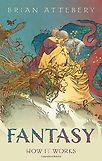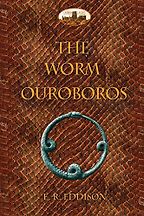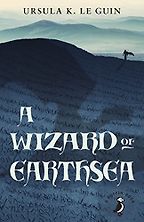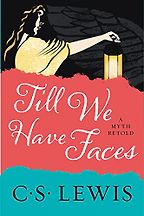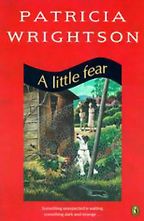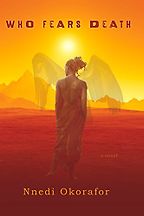Before we talk about your selection of fantasy books, let’s define our subject. What is fantasy?
In a recent article for the Guardian I had to be very concise in defining fantasy. I focused on the impossible, the unreal and the extraordinary – so extraordinary as to take us outside the universe we think we live in. It’s the literature in which those things are present. You cannot eliminate these elements and still have fantasy.
For some readers, they are a stumbling block. I’ve always liked the way fantasy writer Ellen Kushner refers to people who lack the ‘fantasy receptor.’ Lacking this sensibility can be a hurdle for some readers, but it’s a core value for others.
Because fantasy has those irreducible elements of the impossible, the unreal, the extremely extraordinary, it helps us understand better what’s the possible, what’s the real, what’s the true.
Aren’t all humans hardwired to a greater or lesser degree to have fantasy receptors? The fantastical, in the form of mythology, is one of the oldest strands of human storytelling, as you outline in the introduction of your book. Visionary storytelling, which is to say fantasy, is part of our cultural DNA.
Agreed. And if you think about realism, it’s a kind of late and localised development within the larger span of literature, or of storytelling I should say, because some people use the word orature to describe things that are not letters. They’re not literature, but an oral tradition, the long worldwide tradition of telling stories out loud.
There are many subgenres of fantasy books, and many adjacent genres. In your book, you also discuss science fiction and horror, relative latecomers in the human tradition of storytelling. How are fantasy books similar and how are they different from sci-fi or horror, in your view?
I generally think of genre not so much as a category in which to put things, but rather as a way of approaching them. So when I get asked whether a particular book is fantasy, or is it science fiction, my tendency is to say, well, what happens when we read it as fantasy? Certain things will stand out, certain things will work, while other things might not show up so well. Then, if we go back and read the same text with a different approach, does that alter our appreciation? A great example of this is Frankenstein, because you can read it in several generic ways. If you read it as horror, you’re going to notice certain things and it’s going to have a certain effect. But if you read it as science fiction – I think Brian Aldiss was one of the first to make the claim that it is the first great science fiction novel – then a completely different set of elements stand out and start to form patterns of meaning. So that’s the way I approach all of these related genres. Can we read this book as fantasy? Can we read it as science fiction? Can we read it as utopia? Or even as realism, because I don’t think that those are necessarily contradictory. Something can be even more realistic and at the same time more fantastic than what you find in another book.
This contradiction seems to be central to Fantasy: How It Works. How is it that fantasy books can be somehow instructive or socially useful, if it refers to things that don’t exist?
I think of meaning—or theme in literary critical terms—as being like an arrow going from the text to the world. There may be many such arrows—there usually are in a given text—and they only point you toward a meaning, they don’t establish it. And they don’t necessarily change the way you live, the way you perceive. But they might add something, they might redirect some of your attention. In my book, I picked out three primary ways that fantasy can mean something. One of them is the mythic, because the origins of the fantasy genre go back to oral literature’s origins. Fairy tale, myth, legend, supernatural ballads—those are all oral forms that have played a huge part in shaping modern fantasy and it always looks back to them. So the mythic is one kind of meaning that can be invoked.
Another is simply metaphor. Because whenever we are blocked from understanding something literally, we usually look for some way to say, ‘Well, is it making a comparison? Is it is it suggesting an analogy of some kind?’ Fantasy does that very frequently.
The third kind of meaning that I tried to formulate was structural. This may be because I was educated by structuralists way back when. I think that there’s something really profound about seeing in a text not form, which is external and visible, but structure, which is underlying and often kind of invisible. Structures themselves are a kind of meaning. The simplest version of that is just to see the world in binary terms, where we start dividing it into binaries like dark/light, male/female, and life/death. From there, it’s instructive to look at the way we combine those into clusters of meanings, so that we’re dealing not just with a single binary, but potentially dozens of them. In one culture, maybe death gets associated with the feminine, but in another culture, it gets associated with the masculine.
“Fairy tale, myth, legend, supernatural ballads – those are all oral forms that have played a huge part in shaping modern fantasy.”
There’s no absolute set of links among those binaries, so any story can start by setting up a pattern of elements in fundamental opposition in the way that we perceive the world. Here’s the way this particular story world arranges those oppositions. Furthermore, by the end of the story, they often get rearranged, so that this or that element gets moved from here to there, elements change places, and that becomes part of the meaning of the story.
That sounds very abstract. But when you start to look at stories and the kinds of structures they have, story itself appears as a structure. You talk about the beginning, middle and end, the rising action, the denouement—all of those things are structural descriptions. To the extent that a story then can be related to something like a human lifespan, it does so structurally.
So that’s a long, complicated answer to your question, but I think it is one of the important ways that fantasy books, by being impossible to take literally as a description of the world, shift us over to thinking more structurally and looking for underlying patterns.
Let’s talk about your selection of fantasy books. A good place to start would be The Worm Ouroboros (1922) by ER Eddison, who was described by JRR Tolkien as “the greatest and most convincing writer of invented worlds.” That’s high praise indeed coming from him! Why has this made your list as an exemplar of fantasy?
It is one of the classic works and you could say it’s important in the history of the genre. It got pulled back into circulation after Tolkien praised it in the 1960s, and Ballantine Books started republishing classic works that then became de facto fantasy works and part of a fantasy canon. Among the very first ones that were published, after Ballantine issued the Lord of the Rings, were the ER Eddison books, including The Worm Ouroboros. That was even before Ballantine started designating these publications as adult fantasy series, which finally was the collective title they came up with. Eddison came to some of the meetings of the Inklings, which is the group with CS Lewis and Owen Barfield, and others.
The other thing Tolkien said about Eddison is that his philosophy was repellent! He’s not Christian. Not by any stretch. He had a kind of Nietzschean set of values, the superiority of the heroic individual over the values of society. But he was a great world builder, and probably like Tolkien, he was strongly influenced by William Morris, in that regard. It’s kind of a literary link, where The Worm Ourobouros came out in the 1920s, so it precedes even The Hobbit. It’s a link between the great 19th-century romances and modern fantasy.
Fear is something that characterises our current political and cultural moment. I really liked some of your concluding remarks about fantasy, as perhaps an antidote and as a tool for discussing alternate possibilities in the real world. We can use the fantasy realm as a testing ground for things that could have practical application for us as a civil society.
I see in the world around us fear being weaponised. We invoke fear of the unknown, and the other, and those are kind of the same thing. This is often done in order to foster some sort of emotional response and often overt oppression of the other. So fear turns to hatred, which turns to oppression. Not just now, not just here—though I see it in the political rhetoric today.
In thinking about what can fantasy do for us—if it does work in the world as I claim—it should have something to say about this very powerful and very terrible force. So I started looking in my work for references to fear, and stories in which fear was built in. I wanted to distinguish fantasy from horror, because I think it does a different thing. The fear has a different purpose (and I don’t want to go into the whole theory of terror or an HP Lovecraft digression).
But I really like an idea that I got from Canadian sci-fi writer John Clute, which is that the structure of a horror story is incomplete action. Whereas a fantasy goes beyond that point where the horror story would stop and makes you work out the implications and, if not actually solve the problem, at least confront it. If that’s the basic structure of fantasy, I think it’s something you can see in the critical writings of Tolkien and Ursula K Le Guin and many others. There’s that completed action, the second half of the story, that leads us beyond horror to something more integrative. Not necessarily happy, but a sense of moving beyond the point you started from. So I started thinking about books like The Worm Ouroboros and I picked up the distinction clearly here.
It’s also a central theme also in A Wizard of Earthsea by Ursula K Le Guin, the beginning of her great sequence of fantasy tales. I started looking for the sources of this and I remembered I was aware of one of Grimm’s Fairy Tales, which is also retold in Appalachia. I like the title that it’s given in the American South, which is “The Boy That Never Seen A Fraid,” as if ‘a fraid’ were a noun.
The Grimm title is “The Story of a Boy Who Went Forth to Learn Fear.” When I started scouting around for comments about that story, or just information about it, I discovered it was a core example for Soren Kierkegaard in The Nature of Anxiety, in which he was trying to take a complex philosophical look at fear and distinguish it from dread and awe and all of these things. And what did he turn to? He turned to a folktale.
Because the narrative works you through all those stages, from the boy who doesn’t know what fear is, and therefore can walk into horrific situations with ghosts, monsters, terrible death-dealing entities, completely unafraid, to someone who becomes more knowledgeable. Finally, after he gets through all of his tests and challenges and wins his bride, he discovers she’s a very clever princess. She says to him, ‘Okay, you need to know what fear is.’ So she pours a bucket of minnows over him and makes him shudder. And that’s how he learns what fear is.
“A fantasy goes beyond that point where the horror story would stop and makes you work out the implications”
I don’t think Kierkegaard had an expansive sense of humour, but he might have been amused by that. He uses it as an illustration of the difference between the unknowing and the knowing, which is the distinction between simple fear versus the more complex mode of dread. So I went off into reading all of this stuff, and I don’t claim to really understand all Kierkegaard or be a philosopher, but it seemed to me significant that the narrative itself was one of the ways of understanding the force in the world around us. I use that then to examine some of the other examples I thought of besides Eddison.
The other thing about The Worm Ourobouros is it has a poem in it, which Eddison did not write. He liked to quote poems even though he’s writing about a fantasy world, a world in which evidently they have access to our publishing system because he quotes from John Donne and others such as William Dunbar, a 15th-century Scottish poet who wrote “Lament for the Makaris” (which means for the makers or poets). It has a repeated line at the end of every stanza which reads “Timor Mortis Conturbat Me.” It’s a line from one of the Latin offices for the dead and it’s usually translated as ‘fear of death disturbs me.’ If ‘conturbat’ existed in modern English, it would be ‘conturbs me,’ which I really like because it’s a word that shows up for a while in English and then disappears. It suggests the way something can block you from moving forward. ‘Conturbat me’ is exactly what Eddison, Le Guin, and many of the other examples I found, keep coming back to.
Eddison seems to have a thing not only for Elizabethan poetry but Elizabethan turn of phrase. I have to confess it took me a little while to get into it, but once I did, it had an amplifying effect on this very complete parallel world that he’s created.
Yes, an absolutely Baroque style.
You mention in your book that wiser fantasies such as Le Guin’s Wizard of Earthsea (1968) and Lewis’s Till We Have Faces (1956) offer a different interpretation. To face something it is necessary, first, to give it a face.
These fantasy books all seem to fit together in my mind around this theme. Along with others I’ve included a book by Australian fantasy writer Patricia Wrightson, called A Little Fear, and Nnedi Okorafor’s Who Fears Death. They also demonstrate the structural approach that I was talking about, where you confront fear. In the CS Lewis book, Till We Have Faces, there’s a striking line which reads, “How can we meet the Gods face to face till we have faces?” But I think you can also invert that and ask, ‘how can we meet the Gods face to face till they have faces?’ Because it’s the facelessness that is so terrifying. This was a complex pattern that I kept seeing over and over in various ways and tried to thread my way through.
Even though Till We Have Faces deals with Greek mythology, there’s a distinct Christian iconography that recurs in CS Lewis’s work. Whereas in something like Le Guin’s Earthsea, there are Jungian archetypes and a lot of Eastern influences that are reflected in some of her world-building references. Would it be fair to say that in A Little Fear (1982) Patricia Wrightson evokes Australian animism?
That may be why I was attracted to all of those. Wrightson is a writer who got in trouble eventually for using Australian aboriginal mythic materials. At the time she started writing, that didn’t seem to be controversial, appropriating another culture, but by the end of her career, she kind of got erased for having done that. She was a proponent of bringing back native cultures and her thinking was probably filtered through the kinds of narratives that she was familiar with. She was very interested in how you inhabit the Australian continent if you’re a European who’s come in and whose stories don’t quite fit there. They’re like ill-fitting garments. And, yet, you don’t have ownership or rights to the stories that are already there, on the land. So a lot of what she did was to try to find some sort of crossover, some sort of mediation. I think she was probably as successful in this little book, A Little Fear, as in any of them because it doesn’t try to make any claims for the indigenous materials. They stay unassimilated and independent, and yet have to be confronted.
Le Guin was writing probably not intentionally Jungian structures but she has a creature or an entity called the Shadow, so it’s pretty hard to escape Jung on that. And then there’s a lot of Daoism, the kind of sense of the balance forces of the universe. What does a wizard do in that kind of a world? And again, especially with death, which is the ultimate fear that keeps coming back throughout the Earthsea books. The formulation of how you deal with it changes from book to book. I think one of the great things about that series is that she didn’t erase anything she’d done before, but she kept rethinking and complicating the relationships.
Let’s move on to Who Fears Death (2010). Obviously, it has very clear African mythological influences. It’s both post-apocalyptic—with references to the remains of our current civilisation—and also deeply mythopoetic, treating fragments of our current civilisation as if they were from the distant past or distant ancestors, in a really intriguing mix. There are also the influence of oral traditions that most of us in the West won’t necessarily be familiar with.
I think Nnedi Okorafor tends to think of herself as a science fiction writer rather than a writer of fantasy books. It’s one of those books where my question about ‘what happens when you read it as…’ works really well, both ways. For me, it does have that kind of post-apocalyptic, ‘what if the future turns out this way?’ but, at the same time, people can turn into vultures and come back from the dead and so on. It’s powerfully fantasy as well as successfully science fiction.
Okorafor is American but her parents both came from Nigeria and she spent a lot of her childhood going back and forth. She was pretty much immersed in some of the cultures of her family and neighbours there, and often turns to them in her work. I think almost all of her work is rooted in African landscapes, tribal tensions, cultures, beliefs, and so on. Who Fears Death is clearly one of those stories on one level, although she has also said that it’s thoroughly contemporary. It’s drawn right out of today’s headlines because it has to do with ethnic wars and the terrible things that people do in those wars, including weaponised rape. That’s the central driver of the narrative in her story. In a way, perhaps, the book enables readers who might otherwise find it difficult to confront these contemporary realities with a way to enter into the terrible things that are happening around us right now. This goes back to that structural meaning I was talking about. You can take the structure of that situation—which is almost impossible to face directly in real-world situations—and you can see what’s happening. This is maybe where we can intervene and make it not happen.
You’ve said that the 21st century has been characterised by a branching out and rediscovery of many oral traditions from around the world. It also seems to be a particularly vibrant time for fantasy books, do you agree?
Very clearly, based on many measures, including the many movie and television franchises made recently. Superhero movies are a form of fantasy, as are the Lord of the Rings movies, of course. Or take a recent example like the new TV series, The Sandman. Even the Harry Potter series—which I always thought was fairly derivative but which had a lot of charm—became a global phenomenon.
It used to be those of us in the fantasy field would have to stand up for or defend our subject matter, insisting that this is important, it is good stuff. I don’t feel like we have to do that kind of apology anymore. Most people will say, ‘Well, yes, of course!’ Even those who might have resisted a few years ago are starting to come around to Game of Thrones or Neil Gaiman and so on. It’s not only a boom in fantasy, it’s also a broadening of fantasy, and that includes bringing in writers from backgrounds who would probably not have taken part in it 20 years ago.
I’ve been studying fantasy from the time when you could pretty much read all the fantasy books in the field, and there was a time that you could make general statements about it based on that. I don’t think I can do that anymore. If you say one thing about this branch of fantasy, somebody else can come along and say something quite different about African-based fantasies or Australian-based fantasies. There are ever-increasing numbers of Native American-based fantasies and a whole bunch of South Asian and East Asian writing that is excellent. All of this branching out has a lot in common. It tends to look back to the same kind of origins as the Eurocentric fantasy that many of us grew up with but it’s so different!
Five Books aims to keep its book recommendations and interviews up to date. If you are the interviewee and would like to update your choice of books (or even just what you say about them) please email us at [email protected]
Five Books interviews are expensive to produce. If you've enjoyed this interview, please support us by donating a small amount.

